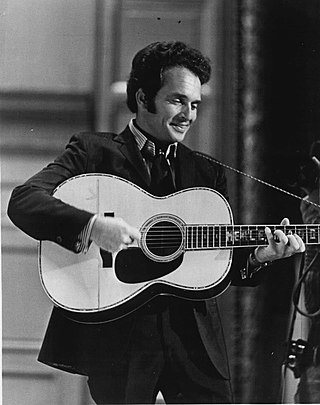
Merle Ronald Haggard was an American country music singer, songwriter, guitarist, and fiddler.
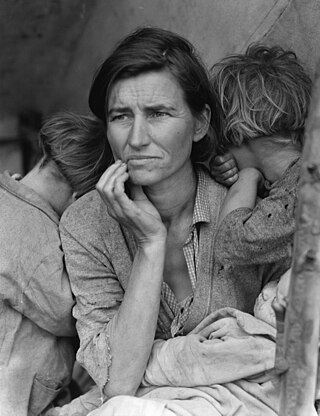
An Okie is a person identified with the state of Oklahoma, or their descendants. This connection may be residential, historical or cultural. For most Okies, several of these connections exist and are collectively the source of their being Oklahoman. While not an official demographic used or recognized by the United States Census Bureau, Okies, due to various factors, have developed their own distinct culture within larger social groupings both akin to and separate from Midwestern and Southern influences. Included are their own dialect, music, and Indigenous-derived folklore.
This is a list of notable events in country music that took place in the year 1970.
This is a list of notable events in country music that took place in 1969.
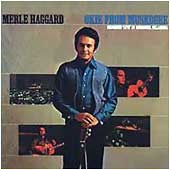
Okie from Muskogee is the first live album by Merle Haggard and the Strangers released in October 1969 on Capitol Records.
A big city is a metropolis.
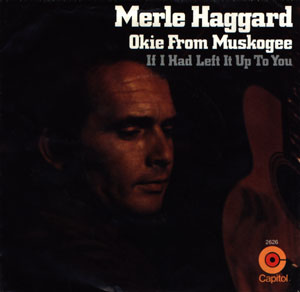
"Okie from Muskogee" is a song recorded by American country music artist Merle Haggard and The Strangers, which Haggard co-wrote with drummer Roy Edward Burris. "Okie" is a slang name for someone from Oklahoma, and Muskogee is the 11th largest city in the state. The song was released in September 1969 as first single and title track from the album Okie from Muskogee, and was one of the most famous songs of Haggard's career.

"The Fightin' Side of Me" is a song written and recorded by American country music artist Merle Haggard and The Strangers. It was released in January 1970 as the first single and title track from the album The Fightin' Side of Me. The song became one of the most famous of his career.

The discography for American country music singer Merle Haggard includes 66 studio albums, five instrumental albums featuring his backing band the Strangers, as well as several live and compilation albums. Haggard recorded for a variety of major and independent record labels through the years, with significant years spent with Capitol Records, MCA Records, Epic Records and Curb Records, as well as his own label Hag Records.
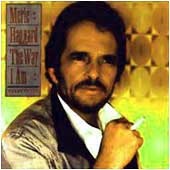
The Way I Am is the thirtieth studio album by American country music artist Merle Haggard, released in 1980.

The Fightin' Side of Me is the second live album by Merle Haggard and The Strangers, released in 1970. Like the song "Okie from Muskogee" led to a quickly released album, The Fightin' Side of Me was also quickly released because of the run of success of Haggard's patriotic hit single "The Fightin' Side of Me".

Let Me Tell You About a Song is the fourteenth studio album by American country singer Merle Haggard and The Strangers, released in 1972. It reached No. 7 on the Billboard Country album chart and #166 on the Pop album chart. The lead-off singles were "Grandma Harp" and "Daddy Frank " — both reached No. 1.

I Love Dixie Blues is a live album by American country singer Merle Haggard and The Strangers, released in 1973.
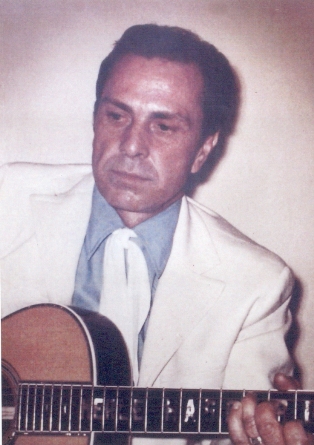
The Strangers were an American country band that formed in 1966 in Bakersfield, California. They mainly served as the backup band for singer-songwriter Merle Haggard, who named them after his first hit single "(My Friends Are Gonna Be) Strangers". In addition to serving as his backing band, members of the Strangers also produced many of Haggard's records, sang lead vocals on select tracks, and co-wrote many of Haggard's songs with him, including the No. 1 singles, "Okie From Muskogee" and "I Always Get Lucky with You".

16 Biggest Hits is a 1998 Merle Haggard compilation album. It is part of a series of similar 16 Biggest Hits albums released by Legacy Recordings.
Gene Price, also credited as Willard Eugene Price and Willard E. Price, was an American songwriter, primarily noted for his songwriting association with Buck Owens. He was also a member of Merle Haggard's backing band The Strangers.

Songs I'll Always Sing is a two-record compilation album by American country music singer and songwriter Merle Haggard, released in 1977. It reached No. 15 on the US Country Charts. The album collects many of Haggard's best known recordings during his successful run at Capitol Records, including nine of his twenty-four No. 1 hits, dating back to 1966.

A Friend in California is the forty-first studio album by American recording artist Merle Haggard with backing by The Strangers, released in 1986.

Amber Waves of Grain is a live album by American country music artist Merle Haggard with backing by The Strangers, released in 1985. It was Haggard's third live album in four years and was recorded at the Hollywood Star Theater. It features a mix of Haggard's big hits and other, more obscure tracks. The title cut, written by Freddy Powers, is a paean to the American farmer, in keeping with the spirit of the Willie Nelson-spearheaded Farm Aid benefit, as does "Tulare Dust" and "The Farmer's Daughter." The LP peaked at number 25 on the Billboard country albums chart.

Flower of Love is a compilation budget album by American country artist Lynn Anderson. It was released circa 1971 via Pickwick Records but is often credited as a 1973 release, the year of its release on 8 track tape and was produced by Slim Williamson. It was her first compilation release for the Pickwick label, reissues of songs Anderson recorded at Chart Records during her years at the label.















